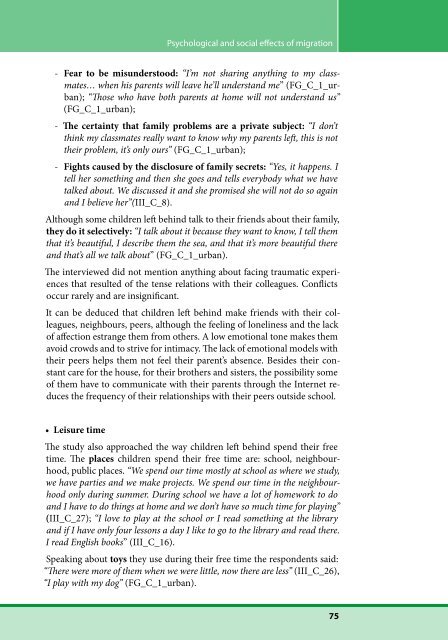specific needs of children and elderly left behind as a ... - IOM Moldova
specific needs of children and elderly left behind as a ... - IOM Moldova
specific needs of children and elderly left behind as a ... - IOM Moldova
You also want an ePaper? Increase the reach of your titles
YUMPU automatically turns print PDFs into web optimized ePapers that Google loves.
Psychological <strong>and</strong> social effects <strong>of</strong> migration<br />
- Fear to be misunderstood: “I’m not sharing anything to my cl<strong>as</strong>smates…<br />
when his parents will leave he’ll underst<strong>and</strong> me” (FG_C_1_urban);<br />
“Those who have both parents at home will not underst<strong>and</strong> us”<br />
(FG_C_1_urban);<br />
- The certainty that family problems are a private subject: “I don’t<br />
think my cl<strong>as</strong>smates really want to know why my parents <strong>left</strong>, this is not<br />
their problem, it’s only ours” (FG_C_1_urban);<br />
- Fights caused by the disclosure <strong>of</strong> family secrets: “Yes, it happens. I<br />
tell her something <strong>and</strong> then she goes <strong>and</strong> tells everybody what we have<br />
talked about. We discussed it <strong>and</strong> she promised she will not do so again<br />
<strong>and</strong> I believe her”(III_C_8).<br />
Although some <strong>children</strong> <strong>left</strong> <strong>behind</strong> talk to their friends about their family,<br />
they do it selectively: “I talk about it because they want to know, I tell them<br />
that it’s beautiful, I describe them the sea, <strong>and</strong> that it’s more beautiful there<br />
<strong>and</strong> that’s all we talk about” (FG_C_1_urban).<br />
The interviewed did not mention anything about facing traumatic experiences<br />
that resulted <strong>of</strong> the tense relations with their colleagues. Conflicts<br />
occur rarely <strong>and</strong> are insignificant.<br />
It can be deduced that <strong>children</strong> <strong>left</strong> <strong>behind</strong> make friends with their colleagues,<br />
neighbours, peers, although the feeling <strong>of</strong> loneliness <strong>and</strong> the lack<br />
<strong>of</strong> affection estrange them from others. A low emotional tone makes them<br />
avoid crowds <strong>and</strong> to strive for intimacy. The lack <strong>of</strong> emotional models with<br />
their peers helps them not feel their parent’s absence. Besides their constant<br />
care for the house, for their brothers <strong>and</strong> sisters, the possibility some<br />
<strong>of</strong> them have to communicate with their parents through the Internet reduces<br />
the frequency <strong>of</strong> their relationships with their peers outside school.<br />
• Leisure time<br />
The study also approached the way <strong>children</strong> <strong>left</strong> <strong>behind</strong> spend their free<br />
time. The places <strong>children</strong> spend their free time are: school, neighbourhood,<br />
public places. “We spend our time mostly at school <strong>as</strong> where we study,<br />
we have parties <strong>and</strong> we make projects. We spend our time in the neighbourhood<br />
only during summer. During school we have a lot <strong>of</strong> homework to do<br />
<strong>and</strong> I have to do things at home <strong>and</strong> we don’t have so much time for playing”<br />
(III_C_27); “I love to play at the school or I read something at the library<br />
<strong>and</strong> if I have only four lessons a day I like to go to the library <strong>and</strong> read there.<br />
I read English books” (III_C_16).<br />
Speaking about toys they use during their free time the respondents said:<br />
“There were more <strong>of</strong> them when we were little, now there are less” (III_C_26),<br />
“I play with my dog” (FG_C_1_urban).<br />
75

















